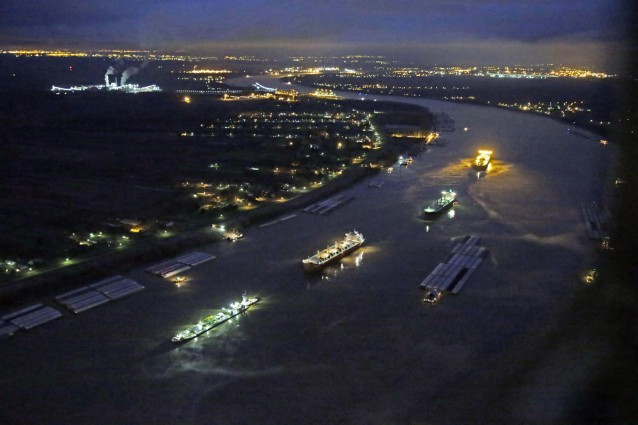http://www.washingtonpost.com/blogs/govbeat/wp/2014/02/24/mcauliffe-will-join-coalition-pushing-for-off-shore-drilling/
BY REID WILSON
February 24 at 10:56 am
www.washingtonpos/2662DBD5.jpg
Gov. Terry McAuliffe (D-Va.) (Mike Theiler/Reuters)
Governors from Mid-Atlantic and Gulf Coast states, including Virginia’s Terry McAuliffe (D), urged Interior Secretary Sally Jewell on Monday to finalize rules that will eventually allow dramatically expanded offshore oil and gas drilling, bringing new industry – and millions in new tax revenue – to some states that have been shut out of the U.S. energy boom.
Jewell and senior Interior Department officials met with McAuliffe, North Carolina Gov. Pat McCrory (D), Alabama Gov. Robert Bentley (R) and Mississippi Gov. Phil Bryant (R) on Monday. The Interior Department is expected to release a Programmatic Environmental Impact Statement within days that would allow oil and gas companies to begin surveying the outer continental shelf for natural resources.
Once the PEIS is issued, seismic surveys for oil and gas deposits could begin within a matter of months.
“We want to find out exactly what’s out there, but we also want to do it in an environmentally sound way,” McCrory said in an interview. He called the meeting “very positive.”
McCrory heads the Outer Continental Shelf Governors Coalition, a group of mostly Republican governors pushing to expand offshore oil drilling. McAuliffe told The Washington Post he would join the coalition – the first Democrat to do so – as he sped out of the meeting Monday.
Expanding offshore oil and gas production could lead to “tens of millions” of dollars in royalties on both leasing agreements and production for states like North Carolina and Virginia, McCrory said. McAuliffe made a point to ask Jewell how much money Virginia could expect from the new drilling operations.
The exact amount of revenue that would fall to the states remains up in the air, subject to revenue-sharing agreements to be worked out between the states and the federal government.
Jewell told governors that the revenue-sharing part of any new production would be out of her hands. She urged the governors to “make the case legislatively,” according to one person in the meeting.
Sen. Mary Landrieu (D-La.), chair of the Senate Energy and Natural Resources Committee, has proposed legislation that would codify a revenue-sharing agreement. McCrory said coastal states are looking to revenue-sharing agreements between the federal government and inland states as models.
The new drilling could also mean thousands of new jobs for rural coastal communities. “There’s a potential to bring new industry closer in to our coast that is desperately needed,” McCrory said.
But before drilling or exploration can commence, states will have to consider objections from environmentalists, who are concerned about the impact on wildlife. The states will also be required to work with the U.S. military, which conducts training operations and manages shipping lanes near areas that could be opened to drilling.
As new technology has led to an energy production boom in states like North Dakota and Texas, coastal states that need federal permission to expand offshore drilling have lagged. Virginia produced 146 billion cubic feet of natural gas in 2012, according to the Department of Energy, and no oil. North Carolina, too, has yet to begin setting rules for hydraulic fracturing and other new techniques that could expand oil drilling.
The Obama administration has been criticized for being slow to open new territory to oil and gas exploration, but the amount of energy produced in the United States has risen to record levels in recent years. Jewell, a former executive at REI and an avid environmentalist, assured the governors that the administration wouldn’t block future development.
“We’re not here to get in the way of energy development,” Jewell said, according to the person present in the meeting.
The governors also urged Jewell to expand offshore wind power, and to set concrete rules for producers who want to expand drilling operations in the Arctic. Alaska Gov. Sean Parnell (R), who faces reelection this year, sent a representative from his office to the meeting.
Special thanks to Richard Charter
